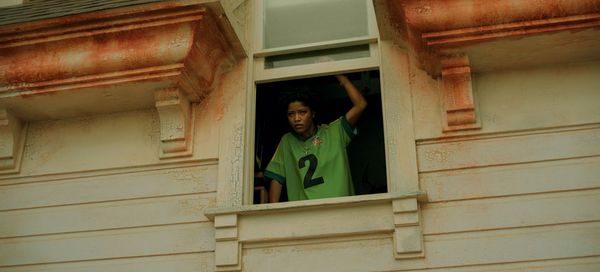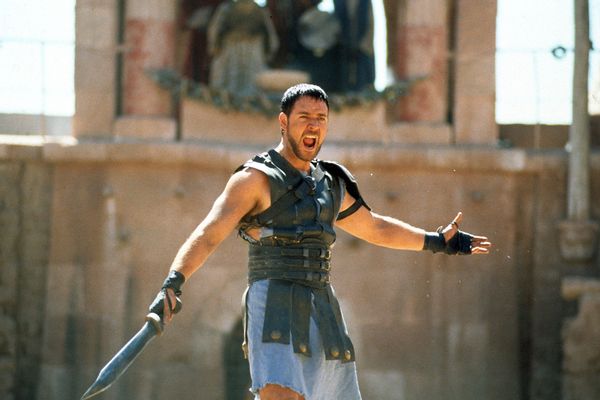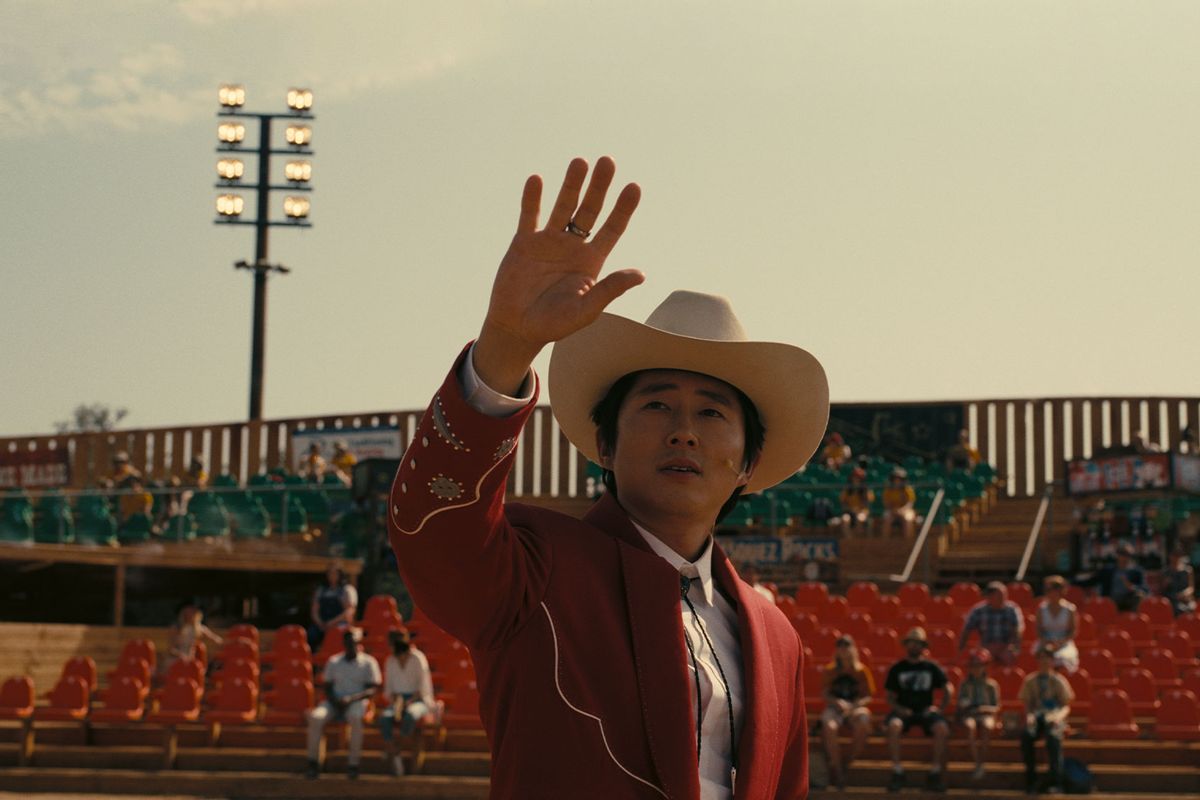Seeing "Nope" placed me in a similar frame of mind where I found myself after taking in "Gladiator" for the first time. I remember it more than 22 years later because of the exchange I had with the people I'd joined to watch Russell Crowe's contribution to the swords and sandals genre.
It struck me as the essential feel-your-oats movie made for a society that believes it's the King of the Mountain, at the height of its powers. When I said as much, my friends thought I was talking about Rome. No, I clarified, I was referring to us, the U.S., I remember one of them rolling her eyes. "Why can't it just be a movie with you?" she said.
Because many movies are never just movies. Ridley Scott knew that then, and Jordan Peele knows it now. Plenty of flicks make it to the marketplace on the strength of the people making them. The ones that become blockbusters hit that achievement because they hook into something swimming through the collective culture at a given time.
"Gladiator" arrived at the end of the Clinton era, right before an election that liberals smugly believed was a done deal for Al Gore, because who in their right minds would vote for that ineloquent idiot George W. Bush? Enough, as it turns out, to send the split decision on the tight election results to the United States Supreme Court. The Dubya era began soon afterward.
Less than a year later, on September 11, 2001, the empire began its long slide down the mountain. Terrorists flew planes into the World Trade Center towers, igniting an unwinnable war we've only recently and disastrously brought to an end. Everyone looked to New York that day, then to Iraq and Afghanistan, eventually turning our gaze angrily at each other, or downward.
Not inward, in any thoughtful way. Instead, we perfected the art of looking at ourselves, drawing attention to ourselves, and viewing others not with human estimation, but through electronic lenses and filters.
Around 2003 our mobile phone cameras and screens improved to the point that photographing ourselves developed into an art form. YouTube was founded in 2005 and soon encouraged users to make themselves the show. MySpace, Facebook, Flickr, then Instagram, apps in general encouraged us to become more sophisticated about our solipsism. Thinking of ourselves as brands became necessary to successful interact with the world, and one another, through small screens and texting and swipes.
Peele ... embraces spectacle in "Nope," but uses it to gaze at who and where we are now much more straightforwardly.
"Gladiator" purports to examine the qualities that make a leader worth following via the story of Crowe's general-turned-arena fighter Maximus, whose (America, circa 2000) mantra is strength and honor. But this is simply philosophical window dressing to Scott's shimmering presentation of spectacle.
Peele also embraces spectacle in "Nope," but uses it to gaze at who and where we are now much more straightforwardly. His characters aren't interesting in heroic exceptionalism. They're actors trying to profit off quick fame, when they're not playing out our shared tendency toward disbelief our own eyes.
In an interview with GQ, Peele said he wrote the film in 2020 when he and the rest of us were self-isolating because of the pandemic. "[So] I knew I wanted to make something that was about the sky. I knew the world would want to be outside and at the same time, I knew we had this newfound fear from this trauma, from this time of what it meant to go outside. Can we go outside? So I slipped some of that stuff in," he explained.
 Keke Palmer as Emerald Haywood in "Nope" (Universal Pictures)
Keke Palmer as Emerald Haywood in "Nope" (Universal Pictures)
Like Peele's other movies "Get Out" and "Us," "Nope" is a movie best enjoyed by knowing as few plot details as possible. Describing it as Peele's contribution to flying saucer movies doesn't spoil anything. Neither does describing it as a film about choosing how seriously we should take what we see.
That said, I've left out many of the story's details, if you haven't seen the movie yet, stop reading now and correct that. You can always pick this up later.
The "Nope" version of the classic movie U.F.O. is sighted over the financially blighted homestead of Hollywood horse trainer OJ Haywood (Daniel Kaluuya), who with the help of his younger sister Emerald (Keke Palmer) is struggling to keep the family business alive following the sudden death of their father (Keith David).
OJ and Emerald persuade themselves and a couple of allies, including an alien-obsessed Fry's Electronics clerk named Angel (Brandon Perea) and a skeptical cinematographer named Antlers Holst (Michael Wincott), that if they can score photographic evidence of whatever is lurking in the clouds before anyone else can – the so-called "Oprah Shot" – all their problems will be solved.
The Haywoods' property is near a Western-style theme park called Jupiter's Claim run by a former child actor Ricky "Jupe" Park (Steven Yeun), who starred in a 1990s sitcom called "Gordy's Home." His show is mainly remembered for a horrific tragedy involving the chimpanzee that played Gordy. Ricky survived the bloody, violent mess that unfolded.
Nevertheless, he downplays his trauma to the point that he offers access to gruesome, hidden-away mementos of the show to visitors willing to plunk down enough cash. He views his brush with death as another marketing opportunity because, Peele insinuates, on some level he seems to question whether what he saw that day is real.
That denial plays directly into the relationship Ricky negotiates in his head with the unidentified flying object in the sky, which he's decided to call the "Viewers." He believes he understands the saucer's motivations and that somehow whatever it wants doesn't include bringing any harm to him or his park's patrons. It also presents a chance to rake in a profit, because who doesn't want to gawk at a flying saucer?
 Russell Crowe with sword in a scene from the film 'Gladiator', 2000. (Universal/Getty Images)
Russell Crowe with sword in a scene from the film 'Gladiator', 2000. (Universal/Getty Images)
The "Gladiator" vision of ancient Rome presents a world where commoners judge a man's worth based on what he does when facing deadly, insurmountable odds. Peele's societal view isn't nearly as optimistic about human behavior. Although OJ and Emerald are set up to be the heroes of "Nope," they're still willing to sacrifice themselves to get a piece of the Big Show without knowing what risking their lives is worth.
Indeed, one of the smartest action plans they pull off is to flee to a safer place and, for a time, pretend that the inconceivable terror they witnessed didn't happen. They so intent to deny it that they dreamily fixate on the fish sandwiches they're eating at a fast food restaurant while ignoring the fact that steps away from where they're sitting, a fight is brewing.
The realist can't help viewing the outcome of "Nope" from the perspective of living in a society where it seems as if roughly every other person refuses to believe their own eyes. Those who do are easily distracted by side stories that are more entertaining than the part of the truth that matters most.
"Gladiator" presents a world where commoners judge a man's worth based on what he does when facing deadly, insurmountable odds. Peele's societal view isn't nearly as optimistic .
"Nope" arrived amid the House Select Committee on January 6's televised hearings, in which the public was able to witness never-before-aired footage of insurrectionists storming the Capitol, and hear testimony from repentant (because they were found and charged) rioters who say they acted in support of the former president Donald Trump's claim that the election was stolen.
Probably the most compelling part of the series – the really big show, as it were – came via testimony from former White House aide Cassidy Hutchinson, the assistant to Chief of Staff Mark Meadows who revealed that Trump knew the mob he'd summoned to Washington D.C. that day was armed. But all Trump's allies had to do to cast doubt on her testimony was to claim that part of her story, where she alleges to have heard that Trump physically threatened a Secret Service Agent, never happened.
Other people confirmed her story but to those who don't want to believe the threat Trump and his mobs posed to our democracy on January 6, 2021, was real and remains a danger, a few cronies calling Hutchinson a liar about the cab story is enough to torpedo everything else.
What about the palpable parallels of disbelief evident in record-breaking temperatures sending people to air-conditioned movie theaters to escape the heat? In Europe, historically unprecedented soaring temperatures are killing people. But a viral clip of a British newscaster giggling away a meteorologist's dire warnings about these heat waves proves that even living inside of a disaster isn't enough for modern-day humans to wake up from the delusion that this threat is overblown.
Which is reminiscent of another recent movie that sparked conversation.
Peele seeds "Nope" with a herd of symbols, cinematic homages, tabloid story callbacks, and other sundry Easter eggs, which is part of his brand but, also, part of the film's point. Hunting for hidden meaning within the story and the pictures deepens the complexity of our relationship with the movie, but that's also a distraction from the simple enjoyment of its popcorn flick simplicity.
"Nope" also ends on a strange note, in that it's unclear whether any of what the protagonists go through for a piece of the spectacle was worth the bloody trouble. The fantasist would like us to believe that whoever survives gains something for all the pain they put themselves through.
A film is only as popular as audiences make it through their box office support, which always depends on how effectively a movie taps into a common feeling. That's why Peele's movies are never simply movies, and his theatrical release track record is impressive enough to have made the opening weekend success of "Nope" a foregone conclusion. What remains to be seen is whether that holds in the coming weeks and can be buoyed by the type of repeat business that kept "Top Gun: Maverick" aloft.
In contrast, Peele's recent revival of "The Twilight Zone" never truly took flight. That may be because that title is the product of another man's vision, created to reflect and critique some past version of America whose themes and refrains are still with us.
Want a daily wrap-up of all the news and commentary Salon has to offer? Subscribe to our morning newsletter, Crash Course.
But popular culture and sentiment have a way of cycling yesterday's heroes and obsessions back into vogue after they've been out of sight line long enough for us to miss them.
As Peele conquered the big screen in 2022 with a spectacular parable about fear and denial, Peacock announced that Roland Emmerich, director of such rah-rah blockbusters "Independence Day" and "The Day After Tomorrow," will be making his TV series debut on the streaming service via a straight-to-order series titled "Those About to Die."
The press release describes it as "a large scale Ancient Rome gladiatorial epic" based on the same 1958 non-fiction book by Daniel Mannix that is said to have inspired, yes, "Gladiator." A debut date hasn't been set, but it will be fascinating to see whether we'll be in more of a mood to connect that kind of retro energy.
I suspect we'll still be wanting to look away from the madness unfurling around us, pretending that it can't do us any harm if we refuse to believe in it. That's who we are now. There's no going back.
"Nope" is currently playing in theaters nationwide.
Read more
about Jordan Peele's work and America



Shares